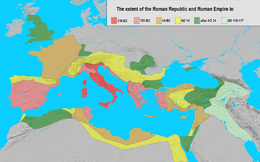AD 14
AD 14 (XIV) was a common year starting on Monday (link will display the full calendar) of the Julian calendar. At the time, it was known as the Year of the Consulship of Pompeius and Appuleius (or, less frequently, year 767 Ab urbe condita). The denomination AD 14 for this year has been used since the early medieval period, when the Anno Domini calendar era became the prevalent method in Europe for naming years.
| Millennium: | 1st millennium |
|---|---|
| Centuries: | |
| Decades: | |
| Years: |
| AD 14 by topic |
|---|
| Leaders |
| Categories |
|
| Gregorian calendar | AD 14 XIV |
| Ab urbe condita | 767 |
| Assyrian calendar | 4764 |
| Balinese saka calendar | N/A |
| Bengali calendar | −579 |
| Berber calendar | 964 |
| Buddhist calendar | 558 |
| Burmese calendar | −624 |
| Byzantine calendar | 5522–5523 |
| Chinese calendar | 癸酉年 (Water Rooster) 2710 or 2650 — to — 甲戌年 (Wood Dog) 2711 or 2651 |
| Coptic calendar | −270 – −269 |
| Discordian calendar | 1180 |
| Ethiopian calendar | 6–7 |
| Hebrew calendar | 3774–3775 |
| Hindu calendars | |
| - Vikram Samvat | 70–71 |
| - Shaka Samvat | N/A |
| - Kali Yuga | 3114–3115 |
| Holocene calendar | 10014 |
| Iranian calendar | 608 BP – 607 BP |
| Islamic calendar | 627 BH – 626 BH |
| Javanese calendar | N/A |
| Julian calendar | AD 14 XIV |
| Korean calendar | 2347 |
| Minguo calendar | 1898 before ROC 民前1898年 |
| Nanakshahi calendar | −1454 |
| Seleucid era | 325/326 AG |
| Thai solar calendar | 556–557 |
| Tibetan calendar | 阴水鸡年 (female Water-Rooster) 140 or −241 or −1013 — to — 阳木狗年 (male Wood-Dog) 141 or −240 or −1012 |

The Roman Empire in 14 (all colors except dark and light green)
Events
By place
Roman Empire
- Augustus' third (and final) 20-year census of the Roman Empire reports a total of 4,973,000 citizens.[1]
- August 19 – Augustus, the first Roman emperor, dies and is declared to be a god.
- September 18 – Tiberius succeeds his stepfather Augustus, as Roman emperor.
- Legions on the Rhine mutiny after the death of Augustus;[2] Germanicus restores discipline amongst the legions.
- Germanicus is appointed commander of the forces in Germany, beginning a campaign that will end in 16.[3]
- Germanicus leads a brutal raid against the Marsi, a German tribe on the upper Ruhr river, who are massacred.[4]
- The town and port of Nauportus are plundered by a mutinous Roman legion that was sent there to build roads and bridges.[5]
- Sextus Appuleius and Sextus Pompeius serve as Roman consuls.
China
- First year of tianfeng era of the Chinese Xin Dynasty.
- Famine hits China; some citizens turn to cannibalism.
By topic
Art
- The Hellenistic period ends, according to some scholars (usual date 31 BC).
Births
- Lucius Caecilius Iucundus, Roman banker (d. AD 62)
- Marcus Junius Silanus, Roman consul (d. AD 54)
Deaths
- August 19 – Augustus, Roman emperor (b. 63 BC)
- August 20 – Agrippa Postumus, Augustus (b. 12 BC)
- Gnaeus Pompeius (Rufus), Roman consul
- Julia the Elder, daughter of Augustus[6] (b. 39 BC)
- Lucius Aemilius Paullus, Roman consul
- Parthenius of Nicaea, Greek grammarian
- Paullus Fabius Maximus, Roman consul
- Sempronius Gracchus, Roman nobleman
Notes
- "LacusCurtius • Res Gestae Divi Augusti (II)". penelope.uchicago.edu. Retrieved February 22, 2017.
- Tacitus; The Annals 1.31
- Tacitus, The Annals 1.49
- Tacitus, The Annals 1.51
- Tacitus, The Annals 1.20
- Tacitus, The Annals 1.53
gollark: Correction: they have not, apparently.
gollark: Algorithms have been patented plenty before, no?
gollark: Is proof of personhood really the issue which actually needs to be addressed for most usecases?
gollark: I don't actually like TPMs much because they're "trusted" by other people, and not the actual device owner.
gollark: I see.
This article is issued from Wikipedia. The text is licensed under Creative Commons - Attribution - Sharealike. Additional terms may apply for the media files.